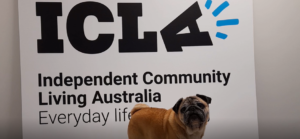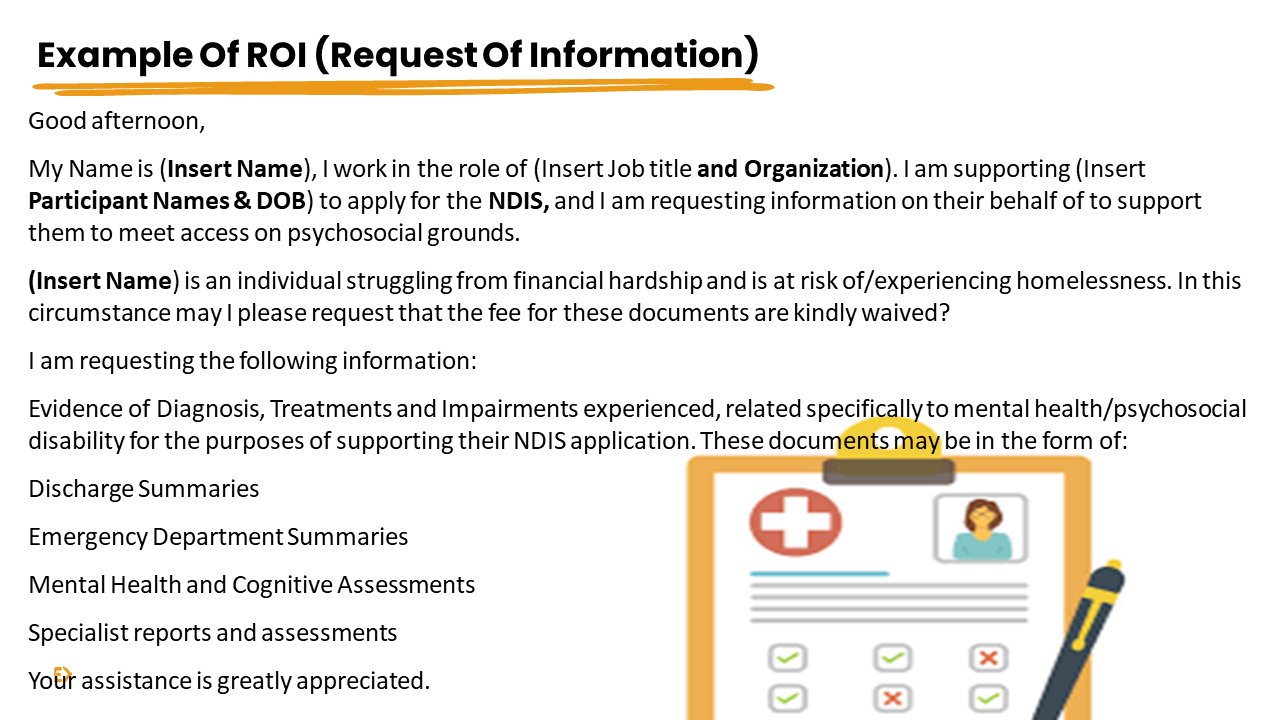
Thanks for joining us in our Embark blogpost series, where we share some of our tips for supporting people to access the NDIS. Embark provides support to people with disability living in the Sydney Metropolitan area that are living with a mental health condition and experiencing (or at risk of) homelessness, to access the NDIS. [You can make a referral to our free service via: www.icla.org.au/embark/]
You can also get in touch for support – via Embark Upskill, we facilitate free workshops across NSW, open to anyone who wants to improve their confidence and understanding of the NDIS in order to support people with a mental illness to access the NDIS and obtain the supports they need. [Make an enquiry via: www.icla.org.au/embark/upskill]
Here at Embark, requesting medical documentation is a big part of what we do – and for good reason!
There are multiple ways that we can go about requesting information and documentation not only to support an effective NDIS application, but also to assist us in building a thorough and detailed picture of the participant’s needs.
Now it goes without saying there are some major hurdles and barriers when attempting to collect documentation, but in general there is always a way around them. Some of the most common barriers that are faced below –
- Apparent lack of diagnoses, evidence or reports: Remember, it is likely that this person has been seen by someone, somewhere along their travels, e.g. a hospital, mental health service or potentially a drop-in center. Listen to their story, find out where they have been, if they have stayed in a particular place for an extended time, what services they have connected with and if and where they may have been treated over the years. Have they ever been hospitalized? Is there a doctor they have seen several times during their life? Maybe there is a trusted friend, family member or support person who can provide further information, as well. Ask a lot of questions and think outside the box.
- Medical and allied health assessments are expensive: This is a massive one, and can be really challenging, but there are still some things you can try. Some university student clinics offer assessments for free or at reduced prices, and some private clinicians will offer bulk billed or discounted rates for pensioners – it never hurts to ask! It’s also worth checking with local community organizations like drop in centers as sometimes they have access to flexible funding that you could help the person apply for.
- No long-term relationship with any one health professional: People who are experiencing homelessness often don’t have a regular medical professional that they are familiar with and knows their story, and this creates challenges in evidencing the permanency of their support needs. This is where collecting as many hospital discharge summaries as possible can be really helpful to establish a long-term pattern of impairment.
- Providers the person is engaged with are often stretched for time and resources: Homelessness services are generally under resourced with time to assist with gathering evidence or to learn how to prepare an effective application. This is where a referral to Embark can really help!
- People experiencing homelessness are often itinerant and lack access to communication technology like phones and the internet: They understandably have other priorities in their lives, may need to move around to keep safe, and might not have a regular way of contacting them. It’s important to be patient, develop a good rapport so that you’re someone they want to talk to, get them to save your number in their phone (if they have one), be opportunistic – getting their signature on documents when you can, and, take your time, piecing together what you can in the background. Collaborating with specialized homelessness outreach supports that have rapport and regular contact with the person is a great way to get around this as well.
- Medical professionals aren’t used to using NDIS language: Sometimes you can miraculously get your hands on an excellent report for free, but the language used is inconsistent with that used by the NDIS, which can result in mixed messages and weaken the application. Working with a service like Embark can really help here so the clinician can be supported to get some tips on getting language right.
Big barriers, little tips with big impact!
- As soon as possible, obtain written consent to gather evidence on the person’s behalf, Consent is crucial! There’s nothing more annoying than finally getting that hard to reach doctor on the phone only to realise you don’t have a consent form handy!
- Identify as many sources of evidence as possible – open up discussion with the participant and their support networks to identify whether or not medical evidence exists to support their NDIS application (Hint – check out page 8 of Embarks workbook to help with ideas for this).
- QUALITY OVER QUANTITY – Cognitive assessments, OT assessments, neuropsychology reports, psychological assessments: in terms of the kinds of evidence that can be useful for an application, the list goes on and on! Fortunately, one really strong report is just as strong (if not more so) that 50 weak ones. A good report evidences a person’s eligibility for the NDIS i.e. that the person has a disability which is likely to be lifelong, has trialled all available and appropriate treatments for their condition, and in spite of treatment they continue to experience significant impairments, requiring reasonable and necessary support.
- Gather supporting documentation first, prior to completing the access request form of evidence of psychosocial disability form. This way you can align all of your application to the information that you know is available, and you are able to really reiterate and reinforce whatever supporting medical documentation you have submitted.
- Hospital discharge summaries – building a timeline of disability: As previously mentioned, hospital discharge summaries usually hold lots of details that are able to help you establish a long-term pattern of permanence and can also provide clues as to where you might find other places to look for medical documentation. For example, you may receive a discharge summary that states the participant that you are supporting has been seen by a private or community-based psychiatrist, psychologist, regular GP, or another member of health professional that the person has forgotten about. It is always worth finding out the details of these individuals and requesting information from them also – leave no stone unturned!
- Attend medical appointments with the participant. As discussed, some smaller providers and GP’s in the community may not have the time, resources, or administrative procedure for obtaining documentation strictly for an NDIS application – Its worth joining the participant to appointments with health care providers to outline what information and language is going to be most useful, and what will not be as helpful to evidence that the person meet’s the NDIS’s eligibility requirements.
- Make use of a ROI (request of information) form/template: When requesting information from providers, you want to communicate succinctly and clearly why and what information you are requesting. Using a ROI template like the example below can take a lot of the guesswork out of this process:

Request Of Information – Mr John Smith – DOB – 12/12/1990 – Re: NDIS Supporting Evidence
MORE RESOURCES
- See our ‘News and resources’ section here – https://icla.org.au/embark/access/
- Support for GPs and other health professionals – https://www.ndis.gov.au/applying-access-ndis/how-apply/information-gps-and-health-professionals
- Supporting evidence for psychosocial disability – https://reimagine.today/apply-for-ndis-support/providing-supporting-evidence/
- Get support from a Local Area Coordinator – https://www.ndis.gov.au/understanding/what-ndis/whos-rolling-out-ndis/lac-partners-community
Thanks again for joining us. Please be in touch with any questions or suggested topics for future content via embark@icla.org.au.
ICLA’s Embark program is funded by the NSW Ministry of Health to support people with a mental health condition who are experiencing, or at risk of, homelessness to access the NDIS.


Recent Comments